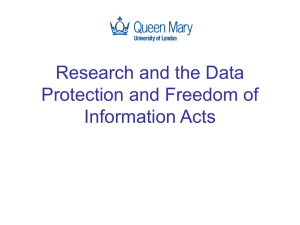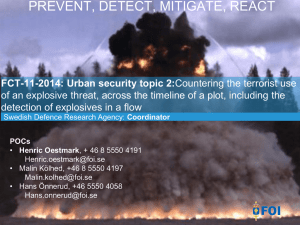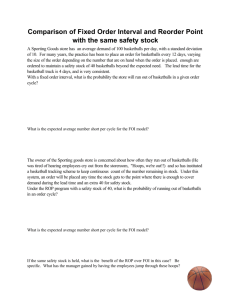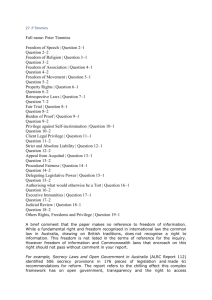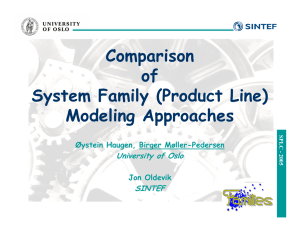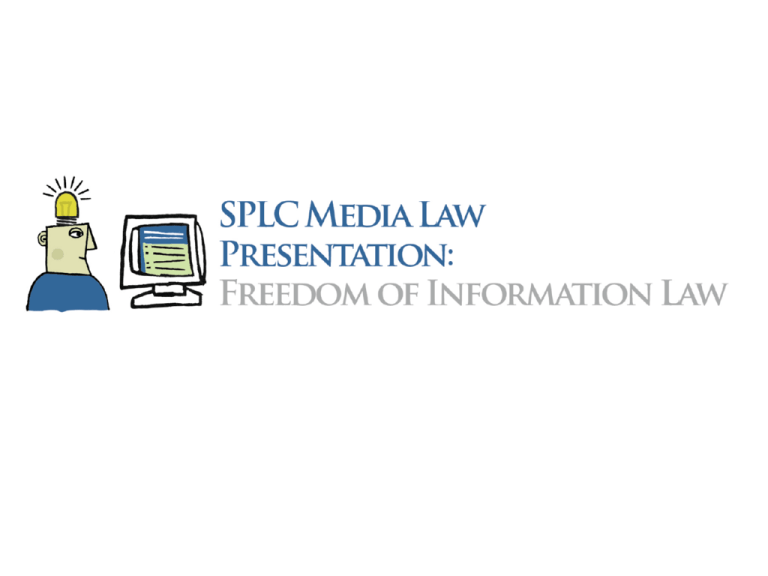
Freedom of Information Law for
High School Student Journalists
A legal guide to obtaining access to public
records and meetings for high school student
journalists and their advisers
This presentation was made
possible by a generous grant
from:
© Copyright 2013 Student Press Law Center
3
Student Press Law Center
Provides free legal help and information on media law
issues to student journalists and their advisers
Web site: www.splc.org
Phone: (703) 807-1904
Monday - Friday
9 a.m. - 6 p.m. Eastern Time
Between Memorial Day and Labor Day the SPLC closes at 4:30 p.m. on Fridays
Freedom of Information Law
Ensuring your right of
access to public
records and meetings
5
3 Main Types of FOI Law
6
3 Main Types of FOI Law
• Open Records Laws
– State open records laws
– Federal Freedom of Information Act
7
3 Main Types of FOI Law
• Open Records Laws
– State open records laws
– Federal Freedom of Information Act
• Open Meetings Laws
– State open meetings laws
– Federal Government in the Sunshine Act
8
Finding your law
www.splc.org/openrecordla
ws
www.splc.org/openmeetinglaws
9
3 Main Types of FOI Law
• Open Records Laws
– State open records laws
– Federal Freedom of Information Act
• Open Meetings Laws
– State open meetings laws
– Federal Government in the Sunshine Act
• “Pocket” FOI Laws
– Federal Clery Act (campus crime records)
– Federal Student Right-to-Know Act (college graduation
rates)
– IRS Form 990 disclosure regulations (private school
budgets)
10
Public/Private “Bodies”
Only “public bodies” or “public
agencies” are covered by traditional
open record and open meeting laws.
11
Public:
Private :
• Federal government
agencies (FBI, Dept. of
Education, etc.)
• State government
agencies (Dept. of
Motor Vehicles, state
colleges or
universities, etc.)
• Local government
agencies (city council,
school districts, school
boards, city police,
etc.)
• Private schools
• Companies
(McDonalds, Old Navy,
etc.)
• Private Individuals
• Most nonprofit
organizations
(churches, private
charities, etc.)
12
“Private Bodies”
• Some “private bodies” perform public
functions and may be covered by FOI laws
(for example, charter schools, private campus
police, etc.)
• Look for alternative “public” sources for
information about private bodies
• “Pocket FOI Laws” often apply to private
bodies through receipt of funding provisions
13
State/Federal FOI Laws
State laws are used to
obtain access to records
or meetings of state,
county or local
“government agencies” or
“public bodies” (for
example, city/campus
police, school district,
health department, etc.)
14
State/Federal FOI Laws
Federal laws are used to
obtain access to federal
government agency
records or meetings (for
example, Environmental
Protection Agency, FBI,
U.S. Dept. of Education,
etc.)
Open Records Laws
General Law: A public
body must make its
records available upon
request unless the records
are explicitly exempted by
statute.
16
Common Exemptions
• Records involving an “ongoing criminal
investigation”
• Disclosure of police techniques; undercover
agent identities
• Information that could jeopardize national
security
17
Common Exemptions
• Some personnel records
(hiring/firing/disciplinary records)
• Records re: pending real estate deals or
ongoing or contemplated legal proceedings
• Documents whose release would constitute an
invasion of privacy (medical, adoption,
personal financial information)
18
Common Exemptions
“Education records” kept by a school
that identify specific students
19
Family Educational Rights and
Privacy Act (FERPA)
• Requires schools to provide a student (or
sometimes parents) with a copy of his or her
“education records” upon request
• Penalizes schools that release a student’s
“education records” without student (or
sometimes parental) consent
20
Family Educational Rights and
Privacy Act (FERPA)
• FERPA does not prohibit student journalists
from publishing or disclosing information
about other students; it only applies to school
officials
• FERPA only restricts release of an
“education record” that identifies a specific
student.
21
Redaction
and Release
Often
Required
22
Requesting Records
• Ask nicely! Verbal requests sometimes
recognized by law
• Submit written request where required or
when “paper trail” needed
23
Requesting Records
After receiving a formal request for records, officials
must — in a timely manner — either:
(1) Provide records
or
(2) Point to applicable statutory exemption
24
www.splc.org/foiletter
25
If You Believe Your Request Has
Been Improperly Denied
• Contact recordkeeper/cite law politely
• Administrative appeal sometimes available
• Judicial review
• Fines and/or attorney fees may be available
26
What Would You
Like to Know?
27
To Find Out…
• How much money does my school spend on
new football uniforms?
• How much does it spend on new library books?
• How much does the school district pay the
superintendent?
28
Ask For:
Your school district’s annual budget
29
To Find Out…
Are the school buses at my school
safe?
30
Ask For:
School bus safety inspection reports
31
To Find Out…
How clean is my school’s cafeteria?
32
Ask For:
Your school’s most recent cafeteria
safety/health inspection report
conducted by the Department of
Health
33
To Find Out…
How does my school rank
academically compared to other
schools?
34
Ask For:
Your school’s
federal “No Child
Left Behind” report
card
Open Meetings Laws
General Law: A public
body must provide notice
of all gatherings and allow
public attendance unless
meeting is explicitly
exempted by statute.
36
Common Exemptions
• Discussion of personnel matters
• Discussion of individual students
• Matters involving highly personal information (e.g.,
medical, personal finance, test scores)
• Discussion of ongoing or contemplated legal
proceedings
• Meetings to discuss the acquisition of real estate
37
Attending Public Meetings
• Show up
• Understand and be prepared to explain the
law
• If told to leave, ask that the minutes of the
meeting reflect your eviction — and then
leave
• Administrative or judicial review available
38
Newsroom
“Must Have”
FOI Law Resource
www.rcfp.org
39
www.rcfp.org
TEXAS
Open Records
IV. RECORD CATEGORIES — OPEN OR CLOSED
K. Police records.
3. 911 tapes. Tape recordings of calls made to the
911 number constitute public information. Tex. Att'y Gen.
ORD-519 (1989). Such records are subject to public
disclosure even if they are held by a "911 network
district" established under the Emergency
Communication District Act. Tex. Health & Safety Code
Ann. §§ 772.201-772.300 (formerly Tex. Rev. Civ.
Stat. Ann. art. 1432d); Tex. Att'y Gen. ORD-519 (1989).
40
www.rcfp.org
“Pocket” FOI Laws
Discovering “hidden” sources
of access law treasure
42
“Pocket” FOI Laws
• Federal “Clery Act” (campus crime)
• State campus crime reporting acts
43
Federal reports show Western
Tech College is safest in state
Central State Univ. reports 32 percent increase in campus
sexual assaults last year; 20 percent jump in thefts
According to reports filed with the U.S. Department of Education last year,
Kennedy High School seniors planning to attend some in-state schools next fall
may want to invest in a can of mace or a police whistle.
The reports, obtained by the Student News, show that campus crime at our state
colleges and universities varies significantly from school to school.
State’s “safest” schools:
1. Western Technical College
2. Jessally University
3. Smith Community College
4. Eastern State University
5. St. Mallard College
Source: U.S. Dept. of Education
WTC had lowest crime rate
44
“Pocket” FOI Laws
• Federal “Clery Act” (campus crime)
• State campus crime reporting acts
• Federal “Student Right-to-Know Act” for colleges
– Access to student graduation rates
– Access to athletic program information
– Access to accreditation reports
45
“Pocket” FOI Laws
• Federal “Clery Act” (campus crime)
• State campus crime reporting acts
• Federal “Student Right-to-Know Act” for colleges
– Access to student graduation rates
– Access to athletic program information
– Access to accreditation reports
• IRS Form 990
… and more
46
Final Things to Remember about
Freedom of Information Law
• There is a legal presumption that the
records and meetings of a public
government body are open and
available
• Ask nicely — but be persistent
Seek help when you need it!
Student Press Law Center
www.splc.org
(703) 807-1904
Monday - Friday, 9 a.m. to 6 p.m. Eastern
Time
Between Memorial Day and Labor Day the SPLC closes at 4:30 p.m. on Fridays
48
Freedom of Information Law for High School Student Journalists was written and produced
by the Student Press Law Center with the support of a generous grant from the Newspaper
Association of America Foundation.
You can help the Student Press Law Center create new generations of Americans who will
understand and defend the First Amendment to the U.S. Constitution and the values it
embodies through your tax-deductible contribution. Go to www.splc.org/give for details.
Permission to use and display this classroom presentation for noncommercial, educational
purposes is hereby granted. Any commercial use, reproduction or editing of this
presentation is prohibited without the express written permission of the Student Press Law
Center.
While every effort is made to ensure the accuracy of the information contained in Freedom
of Information Law for High School Student Journalists it provides general guidance and
information only. It is neither intended nor represented as a substitute for obtaining casespecific advice from a licensed and experienced media law attorney in your state.
© 2012 Student Press Law Center. All rights reserved.


